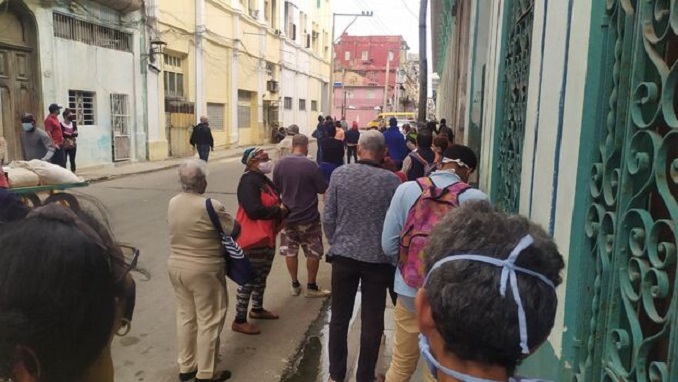Two men in civilian clothes approached a police car on Havana’s Infanta Street on Saturday morning to report on the people in line. These days hundreds of such undercover agents monitor people waiting in lines, on the lookout for anyone making “counterrevolutionary comments,” Translating Cuba article writes.
The informants are easily recognizable in spite of the efforts they make to blend into the crowd. “Look, the one with the blue cap is a security agent,” warns a retiree to another customer waiting to buy frozen chicken outside a store on Belascoaín Street.” I know because the only thing he’s done since he got here is eavesdrop on people.”
Several minutes later a patrol car pulls up and the young man in the blue cap points out two people to the uniformed officers. The police ask the couple for their identity cards and arrest the man. The reason: a few minutes earlier he had made a comment that “this New Year there’s no meat or shame in this country.”
Lines to buy food, especially items intended for year-end celebrations, are now the center of police attention. State Security agents, Communist Party die-hards and members of the Committees for the Defense of the Revolution (CDR) have also been involved.
Faced with an increase in public criticism fueled by economic shortages and the severities of the pandemic, Cuban authorities have been twisting the ideological screws. Propaganda has become more assertive in state-run media while so-called “acts of repudiation” and heavy surveillance of public spaces are becoming more common.
“Reactivate the rapid response brigades in every CDR willing to deny a platform for disaffected elements,” reads a document distributed among the organization’s members. It includes instructions to “support the authorities” during the difficult economic situation in which the island finds itself.
“At the meeting they said imperialists were out to destroy the Revolution [while people wait] in lines and that we have to be vigilant,” says a retiree from the Plaza of the Revolution district who was summoned to “go after anyone who speaks ill of the leaders and the currency unification process.”
Among the duties assigned to the retiree is “preventing people from taking photos for the purpose of uploading them to social networks and denigrating our system,” he explains. “Anyone who sees someone taking a photo with a mobile phone or recording a video can call the police because we are authorized to do so.”
With the arrival of the phone-based internet services in December 2018, reports and complaints by citizens on social networks have increased significantly. Many Cuban internet users employ the new technologies to report corruption, point out problems with the political system and share memes against officials.
Among the most closely watched queues these days are those to buy pork and beer. The government is selling these products at subsidized prices and distributing them to every family in Havana upon presentation of a ration book and identity card.
“No one says anything because everyone knows that there are lots of prying ears in these lines,” admits a customer in line at 26th Street on Saturday for the chance to buy pork at 40 pesos a pound.”A little while ago they arrested a young man for taking a photo and a female Party member shouted at him to leave the country if he didn’t like what the Revolution was doing.”
The quality and quantity of what is for sale has contributed to these complaints. Most stores are not allowed to butcher the meat. Nor has there been enough to go around, as the coordinator of provincial government programs, Julio Martínez, told reporters during a recent broadcast of the Roundtable program, admitting that supply “is very far from being able to satisfy the needs of the population.”
But the criticisms will have to wait for the family dinner table. Any disparaging remarks said in line could lead to a fine or a stint in jail, something no one wants to close out this difficult year.
